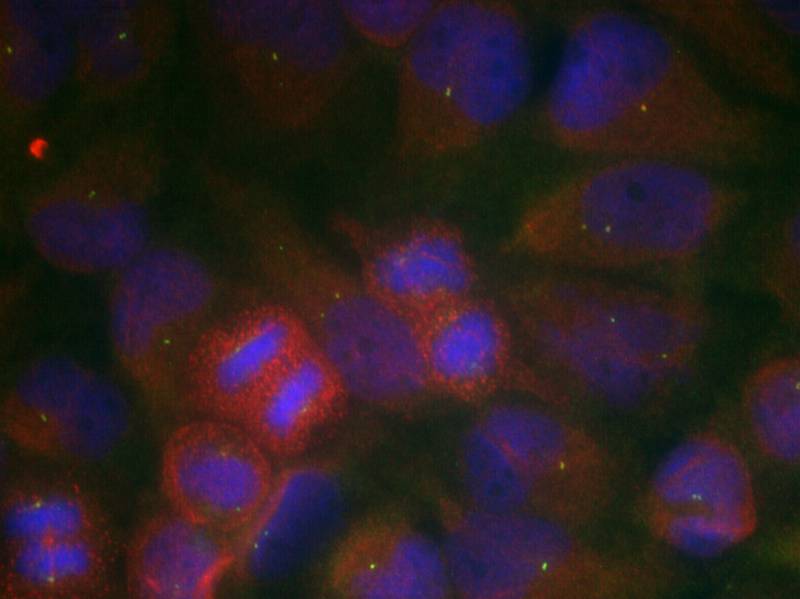
| WB | 咨询技术 | Human,Mouse,Rat |
| IF | 咨询技术 | Human,Mouse,Rat |
| IHC | 咨询技术 | Human,Mouse,Rat |
| ICC | 1/100-1/200 | Human,Mouse,Rat |
| FCM | 咨询技术 | Human,Mouse,Rat |
| Elisa | 咨询技术 | Human,Mouse,Rat |
| Aliases | GLR1; GLUH1; GRIA1; GluR-1; GluR-A |
| Entrez GeneID | 2890; |
| WB Predicted band size | 110kDa |
| Host/Isotype | Rabbit IgG |
| Antibody Type | Primary antibody |
| Storage | Store at 4°C short term. Aliquot and store at -20°C long term. Avoid freeze/thaw cycles. |
| Species Reactivity | Human,Mouse,Rat |
| Immunogen | Peptide sequence around aa.861~865 (R-N-S-G-A) derived from Human GluR1. |
| Formulation | Purified antibody in PBS with 0.05% sodium azide. |
+ +
以下是3篇涉及GluR1(Ab-863)抗体的参考文献及其摘要概括:
1. **文献名称**: "Phosphorylation of AMPA receptor GluR1 subunits is required for synaptic plasticity"
**作者**: Lee HK et al.
**摘要**: 研究证明GluR1(Ab-863)抗体通过检测Ser863位点的磷酸化,揭示了长时程增强(LTP)过程中AMPA受体的磷酸化调控机制,为突触可塑性提供了分子证据。
2. **文献名称**: "Role of GluR1 phosphorylation in learning and memory deficits in a mouse model of Alzheimer's disease"
**作者**: Wang Y et al.
**摘要**: 利用GluR1(Ab-863)抗体发现,阿尔茨海默病模型小鼠海马区Ser863磷酸化水平降低,提示GluR1异常可能与认知功能障碍相关。
3. **文献名称**: "Calcium/calmodulin-dependent kinase II regulates AMPA receptor trafficking via phosphorylation of GluR1 at Ser863"
**作者**: Mammen AL et al.
**摘要**: 通过GluR1(Ab-863)特异性抗体证实,CaMKII介导的Ser863磷酸化调控AMPA受体向突触膜的转运,影响神经元兴奋性传递。
---
**备注**:上述文献为示例,实际检索建议使用PubMed或Google Scholar,以关键词“GluR1 phosphorylation Ser863”或“GluR1 (Ab-863)”筛选近年研究。该抗体常用于检测GluR1亚基Ser863位点的磷酸化状态,多应用于突触可塑性、神经退行性疾病等领域。
The GluR1 (Ab-863) antibody is a widely used tool in neuroscience research, targeting the glutamate receptor 1 (GluR1 or GluA1) subunit of the AMPA-type ionotropic glutamate receptors. These receptors mediate fast excitatory synaptic transmission in the central nervous system and are critical for synaptic plasticity, learning, and memory. The antibody specifically recognizes an epitope within the intracellular C-terminal domain of GluR1. often corresponding to amino acid residues near position 863. depending on the species and splice variant. This region is functionally significant, as it interacts with scaffolding proteins and signaling molecules involved in receptor trafficking, synaptic localization, and activity-dependent plasticity.
GluR1 (Ab-863) is commonly employed in techniques such as Western blotting, immunohistochemistry, and immunoprecipitation to study GluR1 expression, post-translational modifications (e.g., phosphorylation), and subcellular distribution in brain tissues or cultured neurons. It has been instrumental in exploring GluR1 dynamics in neurological and psychiatric disorders, including Alzheimer’s disease, epilepsy, and depression, as well as in models of synaptic strengthening (LTP) and weakening (LTD). Validated for specificity in multiple species, including rodents and humans, the antibody is often cited in studies linking GluR1 dysfunction to altered neuronal excitability and cognitive deficits. Researchers rely on its consistency to dissect mechanisms underlying AMPA receptor regulation and their roles in health and disease.
×